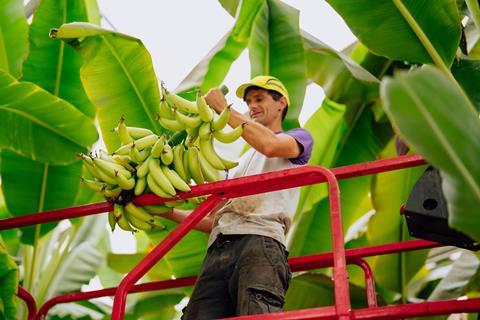Fresh produce giant says it is reinforcing its commitment to ’Behind the Blue Sticker’ strategy and climate action
Chiquita has unveiled its Sustainability Report for 2024/25, looking to highlight its ongoing commitment to sustainability and its efforts in addressing climate change, reducing food waste and enhancing communities worldwide.

Led by Peter Stedman, Chiquita’s director of sustainability, the company said it continued to advance its ’Behind the Blue Sticker’ strategy, anchored by three core pillars: the ’Farmer’s Code’, ’Being a Good Neighbor’, and ’For the Greater Good’.
“Sustainability remains at the heart of everything we do at Chiquita,” said Stedman. “Our 2024-2025 report showcases significant strides in reducing carbon emissions and minimising food waste, while setting ambitious goals for the future.
”These achievements are driven by our unwavering commitment to transparency and the integration of responsible practices across every level of our supply chain.
”Looking ahead, we remain focused on fostering meaningful change, ensuring that our sustainability initiatives continue to positively impact our communities, employees, and the environment that sustains us all,” he noted.
This year’s report placed particular emphasis on the ’For the Greater Good’ pillar, Chiquita said, with a spotlight on the introduction of Yelloway One, a new banana prototype developed through a partnership with Yelloway.
This non-GMO prototype is resistant to both Tropical Race 4 (TR4) and Black Sigatoka, two of the most devastating diseases impacting global banana production.
Another highlight of the report, Chiquita said, was its commitment to fighting climate change through its ‘30by30’ initiative, which aims to reduce carbon emissions by 30 per cent by 2030.
It pointed out ”significant strides” made across Chiquita’s operations, made possible by focusing on comprehensive strategies that tackle emissions across the supply chain, including improved energy efficiency in farming operations, transportation and packaging.
”By incorporating carbon sequestration and waste reduction measures, Chiquita is well-positioned to meet its 2030 targets,” it confirmed.
Additionally, Chiquita said it had has introduced enhanced land-use strategies, identifying 757ha of forested land for carbon sequestration, with ongoing research into sustainable agricultural practices to further reduce on-farm emissions.
The group’s ongoing efforts to reduce food waste across its operations from farm to consumer were also outlined, such as its collaboration with The Banana Factory in the Netherlands, ensuring otherwise rejected bananas are repurposed into banana puree.
“The challenges facing global agriculture, from climate change to social upheaval, are significant, but Chiquita remains committed to addressing them head-on,” said Carlos López Flores, president of Chiquita.
“By decarbonising our production, preserving biodiversity, and promoting bananas as part of a low-carbon diet, we are making critical investments for the future.
”Above all, the health and wellbeing of our people and communities remain our top priority, as their success is integral to our own,” he added.



